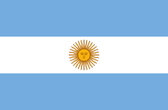
Call 0330 880 3600 Calls may be monitored or recorded. Opening Times.
- TRAVEL INSURANCE
- COVID-19 COVER
- More Options
- Help & Advice
- Existing Customers

Call 0330 880 3600 Calls may be monitored or recorded. Opening Times.

Need help?
UK Customer Services0330 880 3600*
Open Monday to Friday 9:00am to 6pm, Saturday 8:30am to 4pm and closed Sundays.
*Calls are recorded for training and quality purposes.

Official name: Argentine Republic
Capital city: Buenos Aires
Official language: Spanish
Population: Around 45 million
Currency: Argentine peso (ARS)
Time zone: GMT-3
Driving side: Right
Climate: Hot and humid in the north, mild in the centre, and cold in the far south
Argentina is the eighth largest country in the world, stretching from subtropical wetlands to windswept glaciers. Its vibrant culture blends European and Latin American influences — think tango in Buenos Aires, Malbec from Mendoza, and legendary football passion. Travellers come for world-class natural wonders like Iguazú Falls, Patagonia’s icy landscapes, and the wildlife of Tierra del Fuego, as well as for the lively urban life and food scene in its cities.
Argentina borders Chile, Bolivia, Paraguay, Brazil, Uruguay, and the South Atlantic Ocean. Its geography includes the Andes mountains, fertile Pampas plains, subtropical rainforests in the northeast, and Patagonia’s glaciers in the south. This diversity creates huge climatic contrasts, from scorching summers in the north to subpolar chill near the southern tip. It’s a country where you can sip wine in a sunny vineyard one week and trek across ice fields the next.
Argentina has a strong tourism industry, with well-developed infrastructure connecting major attractions. Domestic flights and long-distance buses are the main ways to get around, supported by decent road networks. Driving is on the right, though traffic in big cities can be hectic. While most visits are trouble-free, petty crime such as pickpocketing, bag-snatching, and taxi scams occur, particularly in Buenos Aires. Visitors should stay alert in crowded areas, avoid displaying valuables, and stick to official taxis or rideshare apps.
British nationals can usually visit Argentina visa-free for up to 90 days. A valid passport is required, and onward or return travel details may be requested. Longer stays or work permits must be arranged in advance with the Argentine consulate. Entry requirements can change, so check official advice before travelling.
The Argentine peso (ARS) is the official currency, but the economic situation is volatile, with inflation and exchange rates fluctuating rapidly. Many visitors choose to bring US dollars, which are widely accepted and often preferred in tourist areas. Cash is king outside major cities, and ATMs often have withdrawal limits and high fees. Credit and debit cards are accepted in larger towns but less reliable in remote areas.
Routine vaccinations should be up to date. A yellow fever vaccination is recommended for some northern provinces, and mosquito-borne illnesses such as dengue occur in warmer months. Healthcare in Buenos Aires and larger cities is generally of good quality, but facilities in rural areas are limited. Travellers should carry any essential medication and arrange comprehensive travel insurance that includes medical evacuation. Food and water standards are generally safe, but in rural areas bottled water is the best option.